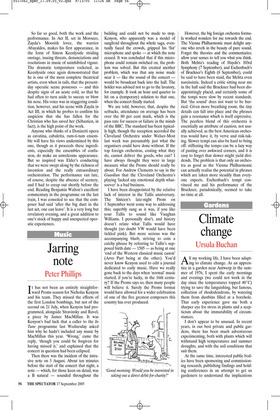Jarring note
Peter Phillips
It has not been an entirely straightforward Proms season for Nicholas Kenyon and his team. They missed the effects of the first London bombings, but not of the second on 21 July, when Kenyon had programmed, alongside Stravinsky and Ravel, a piece by James MacMillan. It was Kenyon’s bad luck that a caller to the In Tune programme last Wednesday asked him why he hadn’t included any music by MacMillan this year. ‘Wrong,’ came the reply, ‘though you could be forgiven for having missed it,’ and explained that the concert in question had been eclipsed.
Then there was the incident of the intrusive note on 5 August. About ten minutes before the start of the concert that night, a note — which, for those keen on detail, was a B natural — sounded throughout the building and could not be made to stop. Kenyon, who apparently was a model of sangfroid throughout the whole saga, eventually faced the crowds, gripped his ‘fist’ microphone and spoke — at which the note ceased. It was concluded that if this microphone could remain switched on, the problem was solved. But this created another problem, which was that any noise made near it — like the sound of the concert would be broadcast back into the hall. The holder was advised not to go to the lavatory, for example. It took an hour and quarter to hit on a (temporary) solution to that one, when the concert finally started.
We are told, however, that, despite the setbacks, attendance on average has been over the 80 per cent mark, which is the pass rate for success or failure in the minds of the BBC. The standard has been typically high, though the reception accorded the Cleveland Orchestra under Welser-Most last week was presumably just what the organisers could have done without. If the top foreign orchestras, costing what they do, cannot deliver the goods, who can? I have always thought they were in large measure what the Proms should really be about. For Andrew Clements to say in the Guardian that the Cleveland Orchestra’s playing ‘lacked any emotional depth whatsoever’ is a bad business.
I have been disappointed by the relative lack of interest in the Tallis anniversary. The Sixteen’s late-night Prom on 1 September went some way to addressing this; superbly sung as it was, if you like your Tallis to sound like Vaughan Williams. I personally don’t, and history doesn’t relate what Tallis would have thought (no doubt VW would have been tickled pink). But more serious was the accompanying blurb, striving to coin a catchy phrase by referring to Tallis’s supposed birth date — 1505 — as being at one ‘end of the Western classical music canon’ (Arvo Part being at the other). You’d never know Kenyon used to edit a journal dedicated to early music. Have we really gone back to the days when ‘normal’ music started, if you’re lucky, in the 16th century? If the Proms says so, then many people will believe it. Surely the Proms format would have allowed for a wider celebration of one of the five greatest composers this country has ever produced. However, the big foreign orchestra formula worked wonders for me towards the end. The Vienna Philharmonic must delight anyone who revels in the beauty of pure sound. Forget the theories and the commentaries; allow your senses to tell you what you think. Both Mehta’s reading of Haydn’s 103rd Symphony (7 September), and Eschenbach’s of Bruckner’s Eighth (8 September), could be said to have been staid, the Mehta even narcissistic. Indeed a critic sitting near me in the hall said the Bruckner had been disappointingly placid, and certainly some of the tempi were slow by recent standards. But ‘the sound’ does not want to be hurried. Given more breathing room, the tiny details can fall into place and the phrases gain a resonance which is itself expressive. The peerless blend of this orchestra is essentially an attribute of caution, not usually achieved, as the best American orchestras would have it, by verve and risk-taking. Slower tempi can also be hard to bring off: stiffening the tempo can be a lazy way of pasting over awkward corners, and it is easy to forget that slower might yield dividends. The problem is that only an orchestra as good as the Vienna Philharmonic can actually realise the potential in phrases which are taken more steadily than everyone expects. Eschenbach’s tempi convinced me and his performance of the Bruckner, paradoxically, seemed to take no time at all.



















































 Previous page
Previous page